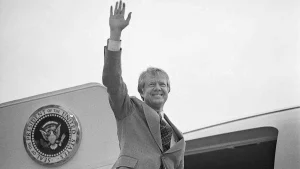Jimmy Carter: A Life Well-Lived
John F. Leary
December 30, 2025
 Since I began my career in Washington, D.C. over 30 years ago, I’ve had the privilege of working with many alumni from the Carter Administration. What stands out about this group is their decency, collegiality, and utter lack of pretense. Unlike alumni from other administrations, they continue to meet regularly — not for fundraising or political maneuvering, but to simply connect and exchange ideas. Scattered across the country, they gather periodically via Zoom on Sunday afternoons to discuss current events. These conversations are rich with wisdom and insight, attracting even former congressional leaders and nationally syndicated columnists eager to listen and contribute.
Since I began my career in Washington, D.C. over 30 years ago, I’ve had the privilege of working with many alumni from the Carter Administration. What stands out about this group is their decency, collegiality, and utter lack of pretense. Unlike alumni from other administrations, they continue to meet regularly — not for fundraising or political maneuvering, but to simply connect and exchange ideas. Scattered across the country, they gather periodically via Zoom on Sunday afternoons to discuss current events. These conversations are rich with wisdom and insight, attracting even former congressional leaders and nationally syndicated columnists eager to listen and contribute.
When my friend and colleague Les Francis asked me last March to join the Carter-Mondale Administration “Untold Stories” Project — a venture Stu Eizenstat and he were spearheading — I didn’t hesitate to say yes.
This initiative seeks to gather and preserve the recollections of former Carter-Mondale officials, capturing a comprehensive and candid historical record. These stories — recorded in 4K video and ranging from humorous anecdotes to profound reflections — are being carefully curated using AI tools. Organized by policy areas and significant events, the accounts may be featured in a potential book, made digitally accessible, and/or archived at the Carter Presidential Library. Together, they illuminate the administration’s achievements, challenges, and enduring impact.
President Carter’s post-presidency achievements are legendary: eradicating diseases that have saved millions of lives, championing democracy, and earning global accolades. But my involvement in this project has revealed a deeper appreciation for his presidency — one that many of us may have missed.
The late 1970s were undeniably challenging, marked by gas station lines, inflation, and the Iran hostage crisis. Yet, when you dig deeper, you find a president who was ahead of his time, quietly transforming America in ways we continue to benefit from today.
Carter approached the presidency like the engineer he was — focused on problem-solving over political theater. He tackled entrenched inefficiencies in industries like airlines, telecommunications, trucking, railroads, and natural gas, slashing outdated regulations to reduce costs for Americans, while not compromising their health and safety. These initiatives fundamentally transformed these industries and created whole new ones. The next time you book a cheap flight, receive an overnight delivery, watch cable TV, or enjoy a craft beer (yes, Carter legalized home brewing), remember… that’s Jimmy Carter’s legacy.
Carter’s foreign policy achievements are equally remarkable. The Camp David Accords, brokered between Israel and Egypt, remain one of the Middle East’s few enduring peace agreements. His decision to transfer control of the Panama Canal — a deeply unpopular move at the time — prevented years of potential armed conflict in Central America. Every president since Eisenhower recognized the necessity of this action. Carter simply had the courage to act, saving countless American lives in the process.
Long before climate change became a global priority, Carter championed renewable energy and introduced tax incentives to promote clean energy adoption. He envisioned a sustainable future, decades ahead of his time.
Carter also reshaped the federal judiciary, appointing more women and minorities to the federal bench than all his predecessors combined. His administration’s work on Title IX laid the foundation for women’s collegiate sports, paving the way for today’s stars like the Lady Gamecocks and Caitlin Clark.
Carter’s decisions often came at great political cost. He appointed Paul Volcker to the Federal Reserve, knowing Volcker’s tough anti-inflation policies would harm his reelection chances. He strengthened the military, laying the groundwork for ending the Cold War — credit that history often assigns to his successor. Even during the Iran hostage crisis, Carter’s principled approach prioritized the hostages’ safety over military action, despite political pressures. He brought every one of them home alive.
What’s most striking about Carter isn’t just what he accomplished, but how he did it. He avoided grandstanding, focusing instead on solving problems and making meaningful changes. His presidency is a reminder that true leadership isn’t about making noise — it’s about delivering results.
Although he never sought it or anticipated it, with Carter’s passing, Americans owe him a profound debt of gratitude. Let’s raise an American craft beer and toast a century of a life well-lived.

